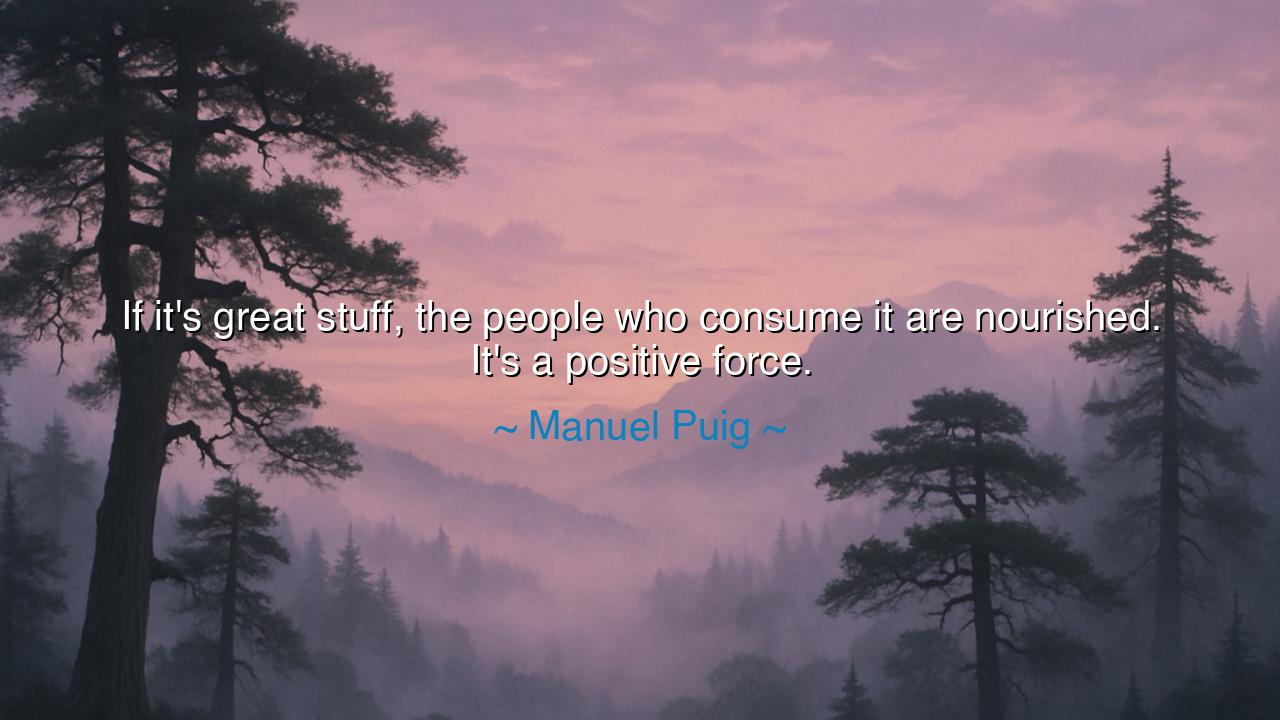
If it's great stuff, the people who consume it are nourished.






Hear, O children of truth and creation, the words of Manuel Puig, who declared: “If it's great stuff, the people who consume it are nourished. It's a positive force.” These words are not merely about art or literature—they are about the essence of what we give to one another. For every work we create, every word we speak, every deed we perform is food for the spirit of others. If what we give is shallow, it withers quickly; if what we give is great, it sustains, strengthens, and inspires.
The meaning of this saying lies in the sacred responsibility of those who create and share. To offer great stuff—whether art, knowledge, kindness, or invention—is to feed the soul of humanity. Just as bread nourishes the body, so do words, images, and ideas nourish the mind and heart. When such offerings are honest, profound, and beautiful, they become a positive force that uplifts entire communities. But when they are false, bitter, or empty, they weaken the spirit of those who consume them.
The origin of this wisdom is rooted in Puig’s own work as a novelist, who believed that stories hold the power to transform. He understood that fiction, when crafted with depth and authenticity, does not merely entertain—it nourishes. His words echo the ancients who knew that song, myth, and tale were not frivolities, but vessels of culture and memory, carrying wisdom through the generations. To create, then, is to wield power—the power either to nourish or to poison.
Consider the story of Victor Hugo, whose work Les Misérables was not just a novel but a feast of compassion, justice, and redemption. Those who read it were not left the same; they were nourished by its greatness, compelled to see the poor, the broken, and the oppressed with new eyes. His art became a positive force, stirring hearts to mercy and societies to reform. This is the very truth Puig points to: that great stuff feeds not only the mind but the soul, shaping the destiny of those who receive it.
Think also of Martin Luther King Jr., whose speeches were more than mere rhetoric. They were sustenance for a weary people, filling them with courage to face hatred and hardship. His words—crafted with vision and love—were great stuff, and thus they nourished a generation, turning despair into hope and inertia into action. His voice was not simply sound; it was bread for the spirit, a positive force that still feeds the world today.
O seekers of tomorrow, take heed: everything you produce, everything you release into the world, is consumed by someone. Your speech, your art, your labor, your presence—these become nourishment for others. Will you feed them with hope, beauty, and truth, or will you burden them with emptiness, cynicism, and decay? The choice is yours, for you are both a consumer and a creator in the grand feast of life.
Practical wisdom calls you: seek to consume only what uplifts, for what you take in becomes part of you. Choose books, songs, and companions that strengthen your soul. And when you give, give with care. Let your words be kind, your work excellent, your art sincere. In this way, you become a source of sustenance, a well of living water, a bearer of light.
Thus remember Puig’s teaching: “If it's great stuff, the people who consume it are nourished. It's a positive force.” Make it your vow to give the world only what is nourishing. For in so doing, you join the eternal chain of those who uplift humanity—not with armies, not with riches, but with the simple, mighty act of offering greatness that feeds the soul. And your life, like the finest bread, will strengthen all who partake of it.
––






Ttranphantuankhoa
This quote makes me consider how society values cultural, artistic, or intellectual contributions. Are works with immediate gratification less likely to nourish than those requiring deeper engagement? I also wonder about the long-term effects: can a single piece of 'great stuff' influence personal growth, ethics, or emotional well-being over time? Finally, does the creator need to intend the work to be a positive force, or is the effect independent of intention?
THThuy Ho
I feel inspired by this perspective, yet it raises questions about subjective interpretation. Can something unintentionally harmful still be perceived as nourishing by some? Conversely, can highly praised works fail to connect with certain individuals? It also makes me think about the ripple effect: does the nourishment received by consumers inspire them to create or share more positivity themselves, amplifying the overall impact of great work?
TMLe thao My
Reading this, I’m curious about the responsibility of creators. If what we produce has the power to nourish others, does that mean we should be more mindful of the content we release? How do creators balance authenticity with the desire to be positively impactful? Additionally, I wonder if there’s a measurable way to assess whether a piece of work genuinely acts as a positive force in the lives of its audience.
VTVan Thanh
This statement makes me reflect on the idea of quality content and its broader impact on people’s lives. What defines 'great stuff'? Is it the creativity, depth, or the emotional resonance? I also wonder whether the positive force Puig mentions applies universally, or if individual preferences and experiences can alter its nourishing effect. Can something considered excellent by many still fail to provide value to certain individuals?